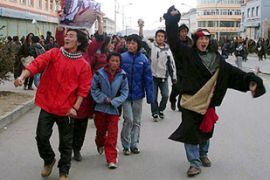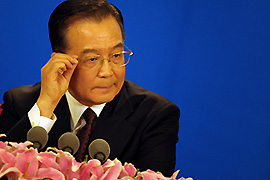Dalai Lama calls for calm in Tibet
Exiled Tibetan spiritual leader says he may step down if unrest in region worsens.

His comments came as the Tibetan government-in-exile, based in Dharamsala, northern India, said 19 Tibetan protesters were shot dead in China’s Gansu province on Tuesday.
It said that a total of 99 people had died after a week of unrest.
China says Tibetan rioters killed 13 civilians during the protests in Lhasa, and that the Chinese government did not use lethal force to quell the rioting.
‘No independence’
Speaking from Dharamsala, the Dalai Lama said he was not in a position to tell Tibetans living under Chinese rule to “do this or do not do that”.
Wen’s criticism of the Dalai Lama is the highest-level response so far to the biggest protests against Chinese rule in almost two decades.
He said the protests had shown that “consistent claims by the Dalai clique that they pursue not independence but peaceful dialogue are nothing but lies”.
 |
| Wen: China will talk to Dalai Lama only when he gives up independence ambitions [AFP] |
Defending China‘s crackdown on the protesters, he said the response of the security forces had been “extremely restrained” but he avoided giving any details on the situation on the ground in Tibet.
The protests have also spread from Tibet to Tibetan communities in neighbouring Chinese provinces.
The Chinese prime minister avoided commenting on that development.
Wen said the Dalai Lama’s accusations that China was committing “cultural genocide” in Tibet were “nothing but lies”.
Boycott fear
He said those who had protested against Chinese rule wanted to undermine the staging of the Beijing Olympics, which open on August 8.
Hinting at calls from some groups for a boycott of the Games, Wen said the Olympics should not be politicised.
| Tibet key dates |
|
1959 Dalai Lama flees to exile in India after failed uprising against Chinese rule 1960s-70s Hundreds of monasteries destroyed during Chinese Cultural Revolution 1965 China announces creation of Tibet Autonomous Region 1989 Dalai Lama awarded Nobel Peace Prize for leading non-violent struggle for Tibet 2006 Opening of first rail line linking Tibet to rest of China |
Wen’s comments came hours after a deadline passed for protesters involved in the Lhasa uprising to give themselves up to Chinese authorities.
Qiangba Puncog, the Chinese-installed governor of Tibet, set the deadline for midnight on Monday, warning of “harsh” treatment for those who refused to surrender.
There was little indication of any protesters having surrendered after the deadline.
On Tuesday the US-funded Radio Free Asia reported that hundreds of people were being rounded up by security forces, in a possible sign of an intensified crackdown.
Tibet is largely cut off from the outside world, with foreign reporters barred from the territory.
Even activist groups with long-standing connections to contacts in Tibet have indicated they are having difficulty finding out what is happening in the region.
Sydney protests
The uprising in Tibet and the response of the Chinese authorities have sparked protests outside Chinese diplomatic missions around the world.
Several demonstrations have called for the Beijing Olympics, which begin in less than five months time, to be boycotted.
| In depth | |
|
On Tuesday about 100 protesters clashed with Australian police outside the Chinese consulate in Sydney.
Several protesters burned Chinese flags, while others attempted to storm the consulate gates.
Police in Kathmandu, Nepal’s capital, also said on Tuesday that they arrested about 50 protesters who were demonstrating for a UN investigation into China’s operation against Tibetan demonstrators.
Bernard Kouchner, France’s foreign minister, said on Tuesday that the European Union may consider staying away from the opening ceremony of the Olympics, but stopped short of calling for a full boycott.
“Let us consider it,” he said, arguing that staying away from the opening ceremony would be “less negative than a general boycott of the games”.
International concern
Thomas Christensen, US deputy assistant secretary of state, said China’s actions against the Tibetan demonstrators were being closely watched.
“The Olympics is an opportunity for China to put its best face forward and show progress to the world … To be successful, they’re going to have to address some of these issues while the world is watching China,” he said on Tuesday.
Earlier in New York, the UN secretary-general said he was “increasingly concerned about the tensions and reports of violence and loss of life in Tibet“.
Ban Ki-moon said on Monday: “At this time I urge restraint on the part of the authorities and call on all concerned to avoid further confrontation and violence.”
Condoleezza Rice, the US secretary of state, has also repeated US calls for China to exercise restraint, urging Chinese leaders to “engage the Dalai Lama”.

